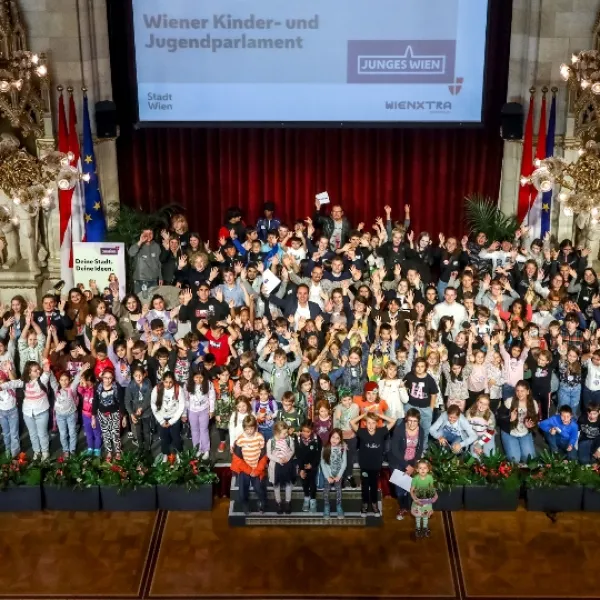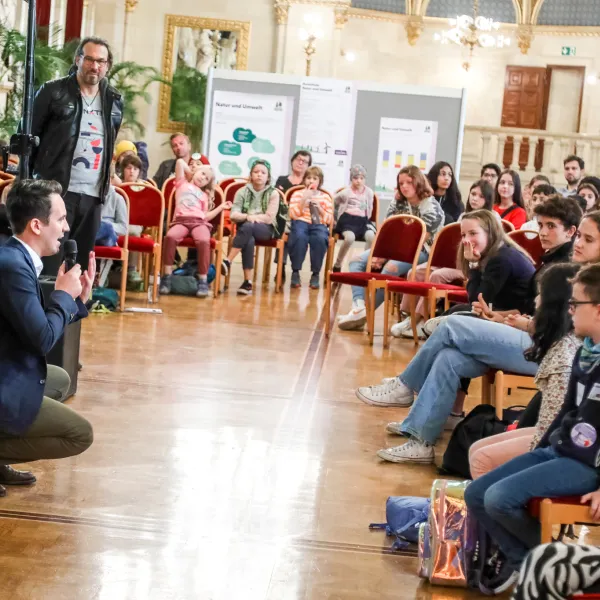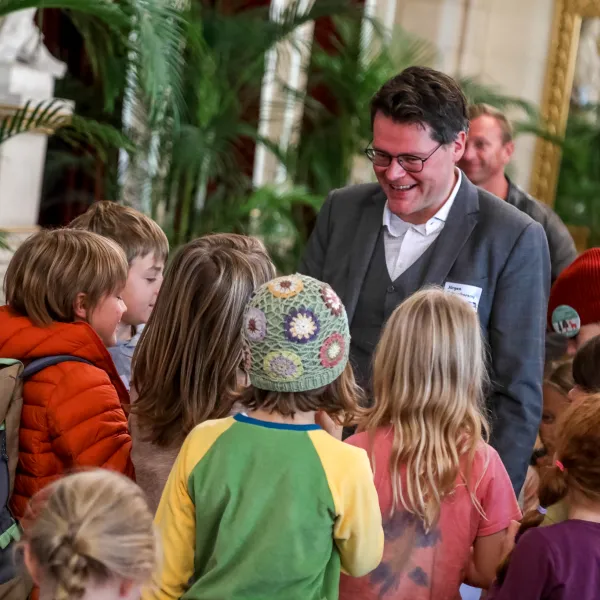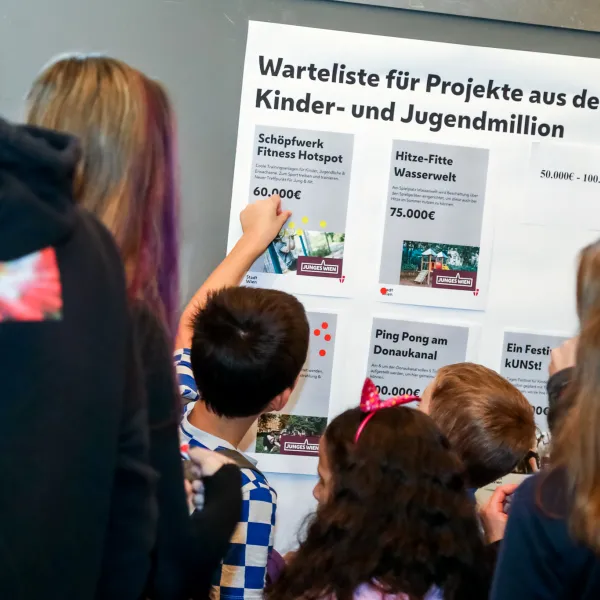Next Generation Civics


City of Vienna
The Action
The City of Vienna launched the Children and Youth Parliaments, a program to bolster civic education and knowledge of governmental decision-making processes among young residents, at the start of the 2021-2022 school year. The Children’s Parliament included 225 participants aged five to 13, while the Youth Parliament had 100 members aged 14 to 20. Due to the pandemic, the first meetings of the parliaments were delayed until May 2022. In October 2022, the Children and Youth Parliaments approved 20 projects submitted by young Vienna residents.
Democracy Challenge
Although Austria lowered the voting age to 16 in 2007, 18 to 30-year-olds remain less likely to vote than members of other age groups. Voter turnout for this group is, on average, 10% lower than general voter turnout, which was 65% in the 2020 Vienna elections.
In addition to low youth turnout in elections, 35% of individuals under 18 in Vienna do not have Austrian citizenship or were born outside Austria, which may contribute to disinterest in the civic process. The children and youth strategy sought to address this disinterest by strengthening civic education and exposing young children to electoral processes to set them up for lifelong democratic participation.
How It Works & How They Did It
Inspired by a study trip to New South Wales, Australia, the City of Vienna collected suggestions from young participants for the future of the city as part of the 2019 Young Vienna Workshop (Werkstadt Junges Wien). More than 22,000 children participated in 1,309 workshops, making this Vienna’s largest participation project to date.
The State Youth Department reviewed feedback and, along with other stakeholders, formed the Vienna Child and Youth Strategy. The city launched the Children and Youth Parliaments, programs for students from kindergarten to age 20, during the 2021-2022 school year. The Children and Youth Parliaments are not elected; rather, young residents can apply directly or be nominated by the city's district administrations.
In addition to the parliaments, young people can submit and vote for projects online. Mayor Michael Ludwig and Deputy Mayor for Education Christoph Wiederkehr allocated €1 million for those projects, which eventually have to be approved by the youth parliaments.
These activities are run by Vienna’s youth and education department and the youth education and social services NGO WienXtra. Participants were chosen from kindergartens and schools, which also held workshops in advance of the Children and Youth Strategy 2020-2025. Other partners included youth associations, detention centers, religious organizations, Vienna’s social housing department, migrant organizations able to reach non-German-speakers, and hospitals housing youth with chronic diseases. The organizers hoped that building a comprehensive network of local organizations would bolster inclusivity in the recruiting process.
The project is entirely funded by the City of Vienna. The mayor’s endorsement made it easy to get the support of all relevant partners and city departments, and the response has been positive.




How’s It Going?
Unfortunately, the parliaments were postponed due to the pandemic, so it was difficult to maintain the early enthusiasm. Nonetheless, young people remained engaged online. More than 200 projects, many of which were plans to make public spaces more useful to young people, were submitted online for consideration by the parliaments.
In-person activities resumed in May 2022. At the first meeting, Children and Youth Parliament delegates and city decisionmakers and policymakers discussed submissions with the children who had authored them. Eventually 67 projects were shortlisted; residents aged 5 to 20 voted online for their favorites in September 2022. Over 300 young residents cast their ballot. The following month the Children and Youth Parliament approved 20 projects, which were announced in Vienna’s town hall. The €1 million budget is focused on measures to improve accessibility in city infrastructure, update public sport and recreational facilities, and provide free menstrual products in schools. The project will continue in 2023.
Considerations
- Allow adequate time for planning. Cities should allow staff six months to prepare for both the parliaments and the participatory budgeting projects.
- Get schools, top officials, and external stakeholders onboard early. Strong partnerships were vital to the project’s success, since the youth and education department is small in Vienna. Support from top political officials was needed to show Vienna’s commitment to becoming the world’s most child-friendly city. Vienna schools were also important partners when planning youth activities. Additionally, project organizers interviewed more than 100 liaisons from city departments, schools, and youth organizations to ask for their support and gather feedback on the project.
- Choose projects with visible milestones that will keep kids motivated. A five-year-old who took part in a workshop in 2019 is unlikely to be interested in the outcome in 2022. To get kids to stay involved, they need to be able to see their impact.
- Create standardized, age-appropriate materials for educators. The city distributed a clear set of methods and material to the schools and kindergartens to share with the youth participants. The guide is available online and free to download in German and English here.
Point of Contact
Julia Kernbichler
Press Officer, Department of Education, Youth, Integration and Transparency of the City of Vienna
[email protected]
+43 664 84 915 46
Who Else is Trying This?
- New South Wales, Australia: Strategic Plan for Children and Young People: The Office of the Advocate for Children and Young People works to give children and young people a say in policy by connecting them with governmental and non-governmental agencies.
- Cities in Germany: OPIN (Was Youthpart #Local until 2014): Helps selected local communities introduce Internet-based methods to sustainably grow youth participation.
- Hämeenlinna, Finland: Nuva: 14- and 15-year-old students vote on key local planning and budgeting initiatives. Each school has two child representatives on the local Youth Council, which has an annual budget for implementing initiatives. Children created a dictionary in which complex terms often used in municipal governance such as “action plan”, “strategy”, and “budget” are explained in easy-to-understand language.
- Colomiers, France: Youth Municipal Council (CMJ): Members aged nine to 14 years old are elected by their peers in six electoral districts. The council is divided into four committees that work on substantive proposals submitted by candidates.
- Cities in Turkey: The Child Friendly Cities Initiative: Establishes child assemblies for children aged seven to 18 years. Through the assemblies, children can organize, get informed about their rights, identify priorities, and contribute to municipal processes, including development planning and budgeting.